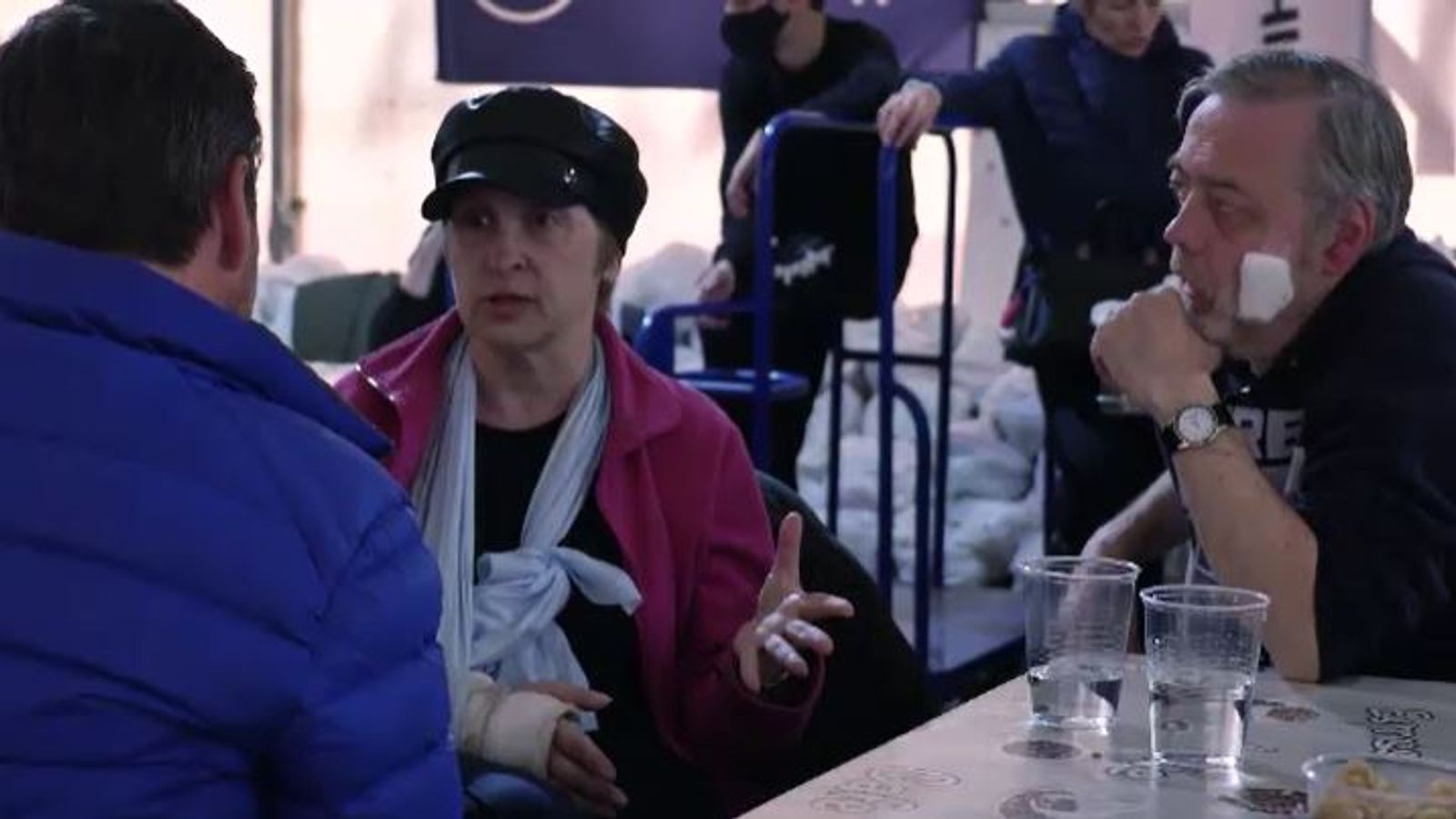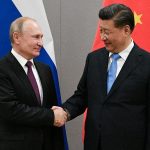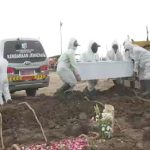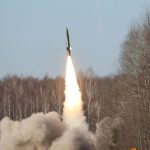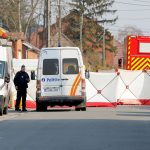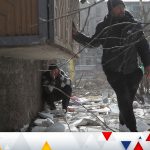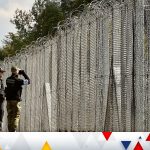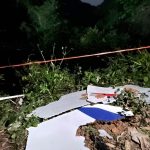Behind the faces of those who have escaped Mariupol is the trauma of 45 days in hell.
A car park in the Ukrainian town of Zaporizhia is where those who managed to escape arrive.
To call them the lucky ones though would be wrong. They have experienced true horror.
This is the story of the Buraks.
We spotted husband and wife Valeriy and Tatyana as they arrived.
Tatyana, with her cast arm in a sling, and her husband Valeriy, with a plaster on his face covering a jaw that appeared to be broken.
Ukraine news live: Johnson and Truss banned from Russia; Ukrainian PM ‘to visit US’
Ukraine war: 102-year-old fundraiser holds silence in support of Ukrainian refugees from his garden
Ukraine war: Former housing secretary Robert Jenrick MP is first to take in family of Ukrainian refugees
Ukraine war: Boris Johnson, Liz Truss, Ben Wallace, Rishi Sunak and Priti Patel among politicians banned from Russia
In the tent that acts as a port of refuge as the displaced regroup, eat, pick up some new clothes and wonder how they survived, we got talking. Here’s their story, in their words.
Tatyana Burak: My name is Tatiana Burak and I am an English teacher from Mariupol. We managed to get out of Mariupol three days ago and then we got to Verdansk. And finally, yesterday we tried to get out of that little town to get to this place.
But at one of the Russian roadblocks, we were stopped and our bus was turned back. But today’s attempt was successful. So finally, we came to Ukrainian territory and we even found some of our Mariupol friends here, too. So we are so happy to do it because we have survived 45 days of hell in Mariupol.
Valeriy Burak: My name is Valery Burak. We are husband and wife.
The failed escape
Mark Stone: Thank you so much for talking to us. Let’s start at the beginning. Can you take us to the moment that the Russians arrived? Describe it for me. What happened?
Tatyana Burak: Well, you know that on 24 February, Putin announced this special anti-terrorist operation as he called it. And we were actually planning to leave on this date. But you know, the fate: our car just stopped. It didn’t work and we couldn’t get out.
So as soon as the shelling began, well, we were in our apartment in one of the districts, which is on the left bank. It was probably the first one which they started shelling and we decided to move to another district because our friends thought that it was safer there. So we got into the car of one of our friends and drove to another district.
Valeriy Burak: And already the shelling everywhere was in the full swing and Russian planes started coming and they started bombing. Some of the private houses of our friends were already destroyed on the left bank. So our friends invited us to stay with them in other districts in the centre where they thought it would be safe. But somehow, just before the bridge, our car was shot from different places and so we got wounded and our military helped us to get to this hospital.
Treatment in a hospital being bombed
Mark: So you’ve broken your arm, Tatyana, and you’ve broken your jaw Valeriy?
Valeriy: Jaw, yes. Three of us were wounded.
Mark: And this was from a shell. A Russian shell?
Valeriy: Well, we don’t know the origin of the shelling. You know, no one can say.
Tatyana: At this time, there were many Russian terrorist groups all over the city which you were trying to start chaos, you know, and show people that there is actually no way out. And our Ukrainian military were trying to find these groups. So our guess is that it was one of these groups. So we got to the hospital we got operated on.
Mark: And that was when the hospital was able to function?
Valeriy: It was able to function, yes.
Mark: Now there is no electricity there?
Tatyana: Nowhere.
Valeriy: Two days after we got there, they had no electricity.
Tatyana: There was a constant flow of wounded people. A lot of people got different wounds because of all of the shelling, because of the air bombs, everything and because of tanks. Tanks were also shelling everything. But actually, because of all these attacks, practically all the patients in the hospital were put in the corridors because there was a threat of getting the wounds from the broken windows.
Valeriy: So the wards, you know, all the patients were staying inside the corridors.
Tatyana: They want everybody to go to occupied territory or to Russia. We had a conversation with their newly appointed head doctor of the hospital, and we asked him if we could get some X-ray he said, ‘No, there is nothing like that in Mariupol, but I can evacuate you to Donetsk [Russian occupied Ukraine] and you will get some help’. But of course, we didn’t want to go anywhere in occupied territory.
Valeriy: And, by the way, he was a military doctor, and I guess they’re going to make this hospital a military hospital.
Tatyana: What I wanted to say, and to tell the whole world, is that our doctors, they are real heroes because the doctors, surgeons, they basically stayed in the hospital. They didn’t go. For a month or even more they operated. They tried to help people as much as they could. Only after probably more than a month they started thinking about themselves and their families, and they started leaving.
Mark: And when the bombs were falling in those first few weeks while you were stuck there. Just describe your emotions to me.
Tatyana: It was horrible, because, before that, we could only imagine air bombs like, we saw and heard them in the movies about World War Two or heard from war veterans about it.
But now when we were on our mattresses, on the floor, in the corridors and we heard the sound of the plane and then horrible boom and the whole building…
Valeriy: …the whole building started shaking…
Tatyana: …shaking! Then after one of the bombs fell, the windows in our ward on one side, all the windows got broken. And you know we had very cold temperatures…
Valeriy: …around two or three centigrade in the building…
Tatyana: …below zero. It was so cold because there was no gas, no electricity, no central heating, and the patients had to lie on the mattresses or on their beds. They had one blanket and that was all. It was so cold. It was horrible. And people were so scared because they thought all these bombs and different artillery – we don’t even know the names of all these systems… but it was horrible because we could see the multi-story buildings from the windows of the hospital burning.
We could hear people crying. It was horrible. And the constant flow of people who were trying to come to the hospital to get some shelter because they were scared. They brought children; they were wounded. And some people were killed. Some people were wounded. They were brought without legs, without arms, and killed children. It was horrible.
Bodies in the streets
Tatyana: There was one week when they [the Russians] were especially active in the district where our hospital was because it was right close to the entrance into the city.
And then the shelling moved a little bit and so people try to get out of the hospital to find their friends; to find their relatives because there was no mobile connection. They couldn’t get in touch with anybody.
And so, the first thing people saw, when we got out of the hospital, were dead bodies in the streets. It was horrible. People, different people, different ages, sometimes whole families with children because there was this shell or the bomb and they just got in the wrong place, and they were killed. It was horrible.
Valeriy: The people were coming to the hospital and asked the chief doctor: ‘We have a body at home, what do we have to do with it?’ And she said: ‘Just bury it. Why do you come here?’ You know.
Tatyana: So people started burying their relatives, killed neighbours right in the yards or the multistorey buildings and we saw all the graves.
A school destroyed
Mark: And the school that you taught in, both of you, that too has been destroyed?
Tatyana: Yes, our school was built in 1936.
Valeriy: And it survived the German occupation.
Mark: But didn’t survive this?
Tatyana: No.
A flourishing city
Valeriy: You know, I remember Euro 2012 when my English friend was in Mariupol for a few days during the tournament and we took him around Mariupol and we showed him the drama theatre. We showed him the place where the British consulate once was before the October revolution, you know, over 100 years ago, and he was just pleasantly shocked that these things existed in Mariupol and we took pictures there.
Tatyana: Our city was a flourishing city. Different parks, different buildings, of a lot of people who were enjoying themselves with their children. And we had some historical places, but now we have nothing because, the symbol of the city, the drama theatre, has been bombed and a lot of people who were taking shelter in their basement were killed.
Please use Chrome browser for a more accessible video player
It’s a ghost city. You can see the skeletons, blackened skeletons of nine-storey buildings because they were burnt down. And we don’t even know how many people were killed inside because there is no way of finding anybody for the whole building was burned.
A lot of people were trying to find shelter in the basements of these buildings, and when the building was bombed or when some shell came, some people just were killed in these basements because the building was destroyed, and they couldn’t get out.
Valeriy: They were trapped.
Mark: Do you feel let down by Europe?
Valeriy: People like us, who were there, were just shocked why Europe doesn’t react, because we could hear the number of victims during this siege you know, is going up to 20,000, I guess it’s even more because a lot of corpses, you know, are not found. Many, many, many corpses, I’m sure, are in the apartments which are closed. No one can get there and people just stay there, and many of them are not alive anymore. So this number must be higher than 20,000.
Nothing to come back to
Mark: So what now for you both? What next for you both?
Tatyana: The next thing is we are trying to figure out what to do with our wounds and then we are going to join our oldest son and my sister in Lviv (in western Ukraine) and then figure out where to go. Obviously, we’re not coming to Mariupol, because there is nothing to come to.
The Russians call themselves the liberators. They come and they say, ‘we have liberated you’. From what? They have liberated us from our life. They have liberated us from our apartments, from our money, from our jobs, from our relatives, because a lot of people were killed. So what have you liberated us from? We had a good life. Our city was flourishing.
Mark: Well, I wish you both the very best, and we’re very grateful for you talking to us.
Tatyana: You are welcome. We are glad that we can share with the whole world our story because it just one story of many, probably tens of thousands of people. And some of them will never be able to tell their story because they were killed right within a couple of seconds. You know philosophers say that any experience is useful, but I don’t want such a useful experience like we have had. And I don’t want anybody to have it.
Valeriy: It’s like for 58 years you lived one life and then at the end of March, you started living a different life, you know, and you can’t imagine how it would happen in a peaceful city.
Tatyana: So just remember that Mariupol doesn’t exist anymore, and it was a really flourishing and great city. Unfortunately, there is no city like that anymore, and it’s so it’s horrible. That’s why I mean, we really see what Vladimir Putin should be taken to court. He won’t be able to bring back all these dead people, but at least he can, he can be punished somehow.
Mark: I’m so sorry and I’m so grateful that you’re okay to talk to us.
Valeriy: You’re welcome, thank you very much.
